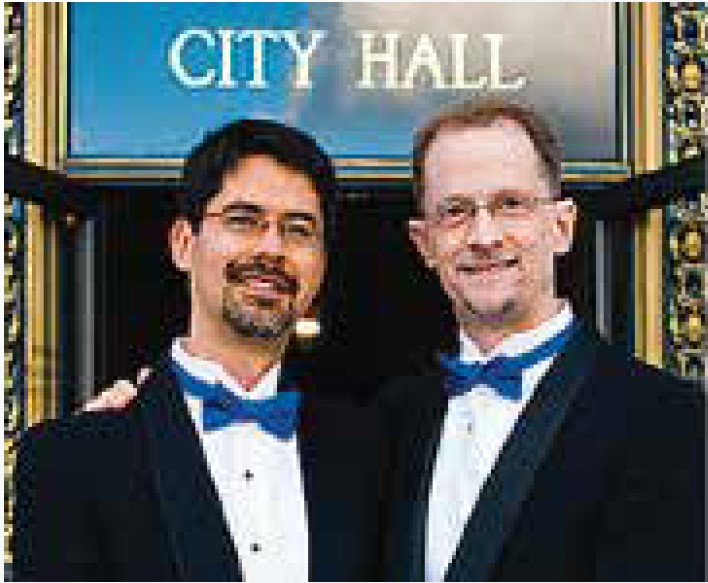
By John Lewis and Stuart Gaffney–
The late Rebecca LePere was one of the most powerful LGBTIQ activists we’ve ever known. She alongside her partner Leslie Ewing and other extraordinary queer activists were the driving force behind the civil disobedience and direct-action affinity group Queer and Present Danger to which we belonged in the late 1980s. Rebecca, Leslie, and other leaders of the group exhibited a ferocity for fighting for queer rights, coupled with ingenious creativity and intelligence, unlike anything we had experienced before.
We once told Rebecca at a party how much we admired her fearlessness in engaging in direct action and other forms of assertive and sometimes angry protest—and how we felt as if we could never do what she was capable of doing. She looked directly at us, responding, “You’ve got to understand: It’s all about love.”

Rebecca’s invocation of love stopped us in our tracks. Her fierce and defiant advocacy was founded on the most vulnerable and intimate of human impulses: love. By that, we presumed she meant deep love, care, and connection with other LGBTIQ people, as well all others facing oppression.
Rebecca was also a staunch advocate for women’s rights, including women’s right to healthcare and treatment for breast cancer, a disease that caused her untimely death. Queer and Present Danger was founded at a time when HIV/AIDS was devastating our community, while the federal government and much of the medical establishment sat idly by in indifference. It was a time when LGBTIQ people had virtually no legal rights and protections as the U.S. Supreme Court had recently upheld the constitutionality of criminalizing the physical expression of love between queer people.
We’ve come a long way since the 1980s, but as we all know we currently face a resurgence of anti-LGBTIQ rhetoric, legislation, legal decisions, intimidation, and violence. A friend of ours recently expressed his dismay and sense of powerlessness at the ascension of anti-LGBTIQ extremist Mike Johnson to the speakership of the House—and thus third in line to the presidency. As has been widely reported in the media, Johnson maintained in 2004 that “homosexual relationships are inherently unnatural,” falsely claiming that “the studies clearly show” they “are ultimately harmful and costly for everyone.” At the time, he was an attorney with the anti-gay legal group, the Alliance Defending Freedom, identified as an extremist hate group by the Southern Poverty Law Center.

A year ago, Johnson introduced national “Don’t Say Gay” legislation to ban LGBTIQ content in elementary education, modeled on Florida’s notorious similar law. This year, Johnson displayed utter ignorance and disregard for the lives of LGBTIQ people when he attacked gender-affirming care for trans youth and even denied the validity and existence of the transgender experience entirely at a Congressional hearing.
In reflecting on how our community should respond to this anti-LGBTIQ onslaught, a famous quotation from the early twentieth century Supreme Court Justice Louis Brandeis comes to mind. Brandeis opined that the Constitution’s remedy for harmful speech that does not incite immediate serious injury was not “enforced silence,” but, in fact, “more speech.” As a threshold matter, Brandeis’ words are a call to the LGBTIQ community to speak out louder and clearer and to live and love more openly and proudly than ever before. As Joanie Juster wrote two weeks ago in this newspaper: “Now is the time for all of us to stand up and fight.” She implored us to vote in next year’s elections, a call echoed by Sister Dana, who reminded us: “For heaven’s sake—Our human rights are at stake!”
But in thinking about Justice Brandeis’ words, it occurs to us that the circumstances we face today demand of us not only “more speech,” but also more of the impulse that our friend and fellow activist Rebecca LePere articulated lies behind it: “more love.”
More love manifests in many ways. Very tangibly, the love that LGBTIQ people have for themselves, each other, and our community—and everything that flows from that—is the reason that marriage equality commands strong majority support across the country. It’s why the U.S. Supreme Court has not moved to reverse it, and even Johnson in a recent interview stated that marriage equality is “the law of the land.”
More love also entails not only active and strategic political engagement, but extending care and support in concrete ways to the most vulnerable members of the LGBTIQ community today, especially trans youth and other transgender and gender nonconforming people who are particularly under attack.
More love was also on display during U.S. Transportation Secretary Pete Buttigieg’s recent appearance on The Late Show with Stephen Colbert. Buttigieg chose not to cut Mike Johnson to shreds verbally as he easily could have done; instead, he took advantage of his status as the most prominent gay dad in American politics. Buttigieg wryly suggested “maybe we’ll just have him over” to his house to hang out with his husband Chasten as they feed their toddlers dinner and change their diapers, just like any parents of young children do. Refusing to allow Johnson to be arbiter of religion in the country, Buttigieg asserted that “the love of God” was in his home.
As outspoken LGBTIQ supporter Tina Turner once queried: “What’s love got to do with it?” When it comes to effective queer activism—everything.
John Lewis and Stuart Gaffney, together for over three decades, were plaintiffs in the California case for equal marriage rights decided by the California Supreme Court in 2008. Their leadership in the grassroots organization Marriage Equality USA contributed in 2015 to making same-sex marriage legal nationwide.
6/26 And Beyond
Published on November 16, 2023
Recent Comments